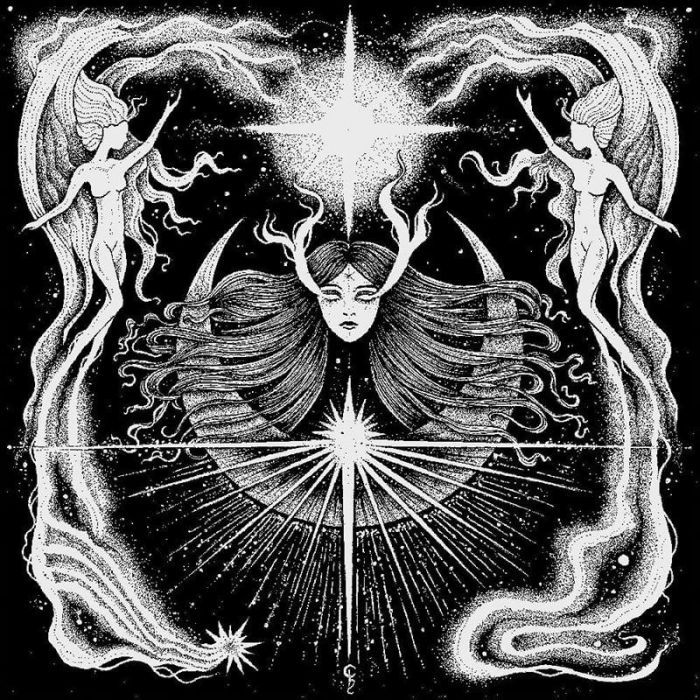Aurora by ISON (Review)

ISON’s Inner — Space was my favorite album of 2019 (read my review), so when founding member Heike Langhans left ISON shortly after the album’s release, I was understandably worried about the band’s future. Daniel Änghede’s eventual decision to keep ISON going as a solo project was heartening, but Langhans’ powerful, mournful voice and existential lyrics had been such an integral aspect of their music that questions still remained.
Would ISON’s “cosmic metal” still be as staggering and awe-inspiring as it’d been on previous releases like Inner — Space and Cosmic Drone? Or had something ineffable and irreplaceable been lost with Langhans’ departure?
The answer to the second question is, well, of course. Langhans’ voice was truly something special, a presence that haunted the band’s otherworldly blend of metal, shoegaze, and electronic music. (She’s now focused on other musical projects including Draconian, Light Field Reverie, and LOR3L3I.) But more importantly, the answer to the first question is a resounding “Yes.”
Any major concerns I had about ISON’s new incarnation were put to rest half-way through “Jupiter,” Aurora’s opening track. When Änghede’s massive walls of sound are matched by the soaring pipes of Vila — one of several guest vocalists who grace the album’s eight songs (more on that momentarily) — it’s precisely the sort of musical experience that you want and expect from ISON. And Aurora is full of such moments.
Änghede’s arrangements, which consist primarily of churning, slow-burning guitars, spacey synth arpeggios, and wistful, contemplative ambience, consistently build to an inevitable and stirring climax. Meanwhile, the album’s vocalists, which also include Cammie Gilbert (Oceans of Slumber), Gogo Melone (Aeonian Sorrow), and Tara Vanflower (Lycia) — as well as Änghede himself — breathe life into lyrics like “My body firmly grounded on the soil of the earth/My soul freely soaring into the light of the universe” (“Meridian”) and “Surrender to inner calm/The universe moves within you/Feel your stars” (“Retrograde”).
The album’s lyrics and themes might be the hardest sell for some folks, not to mention the various spoken word bits about tuning energies, opening up to the universe, embracing the light within, radiating love, and so on. In most contexts, such New Age-isms would probably merit an eye roll or three. But in Aurora’s context, when surrounded by Änghede’s celestial compositions — imagine Alcest, Lycia, Slowdive, and Vangelis swept up together in a supernova’s shockwave — it can make for some rather potent, compelling stuff.
As you might imagine, there’s nothing subtle about ISON’s music or message. Rather, Aurora’s songs are as dramatic and solemn as they are loud and overwhelming, and they move with a decided stateliness. (Most of Aurora’s songs cross the eight minute mark, and then some.) Furthermore, the album’s transcendent songs possess a nakedly emotional quality — and decided lack of cynicism — that’s quite affecting and moving.
When Gogo Melone sings, with a mixture of tenderness and regret, “But I am here with you and I feel alive/All these fears I had to pull through/They never meant to fade your light” on the aptly titled “Celestial,” it’s one of those sublime yet big-hearted moments that could only exist on an ISON album. In other words, you never once doubt Änghede et al.‘s sincerity.
When they sing about opening up to the universe and radiating love, they mean it with every fiber of their being. It’s then up to you whether or not to take them at their word. As for me, I’m quite content getting caught up in these expansive, heartfelt songs, and further contemplate my place in the cosmos.
If I have one critique of Aurora, it’s that I occasionally wish the vocals had been mixed a little more clearly and prominently given that a) so many talented vocalists appear on the album and b) the lyrics are clearly heartfelt expressions by Änghede and his collaborators. While this aesthetic is in keeping with the shoegaze tradition of treating vocals like another instrument, it also feels at odds with the directness and aspirational nature of ISON’s lyrics, as well as the dramatic nature of ISON’s music in general.